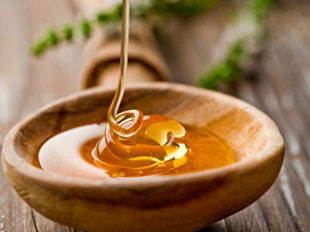Sticky Secrets

Sure it sweetens your oatmeal, but studies are finding that honey is the bee’s knees when it comes to medicinal benefits too. Hear the latest buzz on how this gooey nectar from Mother Nature heals and soothes:
- Cough suppressant. It’s not just an untested folk remedy anymore. Research published in the The Archives of Pediatrics and Adolescent Medicine found that children given buckwheat honey before bed slept better and coughed less than those given over–the–counter honey–flavored syrup.
- Wound ointment. Science confirms the 4000–year–old wisdom that honey fights infections. A naturally occurring enzyme that produces hydrogen peroxide gives all honey antiseptic qualities. But Manuka honey from New Zealand contains antimicrobial properties that go above and beyond this effect. Studies show a high concentration of methylglyoxal in Manuka combats drug–resistant bacteria like Staphylococcus aureus and E. coli. And the FDA recently approved the online sale of a Manuka–soaked bandage called Medihoney designed to heal superficial burns and cuts. You can purchase Manuka from various online sites and in some health food stores — just be sure to look for the UMF (Unique Manuka Factor) label, which certifies it’s from New Zealand and contains the active antimicrobial properties.
- Internal medicine. Manuka has been found to kill H. pylori, bacteria that often causes stomach ulcers and has been linked to stomach cancer. Manuka and sidr honey (a nutritionally potent nectar harvested in Yemen) were also found to be effective against bacteria known to cause sinus infections. And the antioxidants in raw, dark honey may help ward off cancer.

